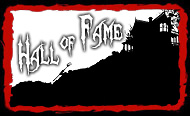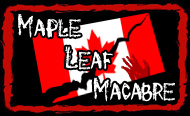
Deadly Games (1982)
Studio: Arrow Video
Release date: February 22nd, 2022
Reviewed by: Brett Gallman (@brettgallman)
The movie:
Every now and then, you’re bound to come across a “what the hell is this?!” movie. They’re not always good, and they’re not always bad—in fact, they often transcend the boundaries of this binary. They’re simply the type of movie that leaves you immediately wondering how they even came to exist in the first place and if anybody involved had ever seen a movie before. Of course, the folks behind Deadly Games had likely seen a slasher movie or two, or they at least noticed that these things were raking in lots of money. Like so many folks with access to film equipment and a willing cast and crew during this era, Scott Mansfield decided to toss his bloody butcher knife into the gore-soaked ring with one of the more peculiar riffs in Deadly Games, a movie that was obviously inspired by the wave of movies that popularized the genre but is ultimately an idiosyncratic, singular affair because, among other things, it’s the only slasher movie to feature Dick Butkus in a prominent role.
The opening scene puts things on solid enough footing: a woman named Linda Lawrence (Alexandra Morgan) is home alone, conspicuously nude, and receiving strange, vaguely threatening phone calls. When she calls her own boyfriend, she insists she’s fine: “I’m not Janet Leigh in Psycho,” she says, in one of the earliest self-aware slasher movie bits on record. Surprise: she pretty much is Janet Leigh in Psycho, meaning she’s toast as soon as a masked man enters her apartment and sends her flying out of the second story window. It’s perhaps a bit strange, but there’s nothing too out of sorts here—it feels very much like your basic slasher prologue, a little playful carnage to kick things off before the story settles in.
Things start to go askew pretty quickly, though, during the police investigation the following morning. Officer Roger Lane (Sam Groom) is on the scene when he encounters Keegan Lawrence (Jo Ann Harris), sister of the deceased, but she doesn’t lead with that; instead, she goes through an elaborate ruse of being a journalist before she cops to the truth. Instead of being frustrated by it all, Roger is more bemused and basically starts hitting on Keegan in the house where her sister was brutally murdered—or maybe it was a suicide, since they’re not too sure. Either way, not professional behavior in my opinion. This flirtatious dalliance is just the beginning of Roger and Keegan’s affair, and I mean that in the literal sense: it turns out he’s married to one of Keegan’s old high school friends, one of several with whom she becomes reacquainted as she hangs out in her old hometown, staying in her dead sister’s house (where she doesn’t even replace the broken window—very unsafe with a lunatic running around!).
Anyway, the murders predictably continue, yet prove to be the the secondary source of intrigue here, taking a backseat to the abundance of interpersonal drama unfolding between all of the characters. Roger isn’t just carrying on an affair with Keegan—he’s apparently making his way through the entire circle of friends, many of whom (including his own wife) have their own side action. Everyone here is terminally horny and unfaithful, and, in one of the film’s standout scenes, Butkus himself (playing one of the various husbands, I think) gives Keegan the rundown. You don’t realize you’ve always needed Dick Butkus spilling tea by the poolside in a slasher movie until you’ve seen it.
The rampant horniness isn’t the only thing odd about Roger and this crowd. He’s also friends with Billy Owens (Steve Railsback!), an oddball loner with a facial scar that he’s protective of because they served together in Vietnam. He’s a projectionist at the local theater, where he and Roger often hang out and play a weird board game based off of the classic Universal monsters (hence the title, which otherwise has little relevance to the proceedings). It seems likely that one of these two is the masked killer, on account of the film’s opening scene, which features the black-gloved maniac playing the very same game. But considering the odd, offbeat energy of this movie, you can never be too sure.
Any slasher movie that’s this light on slashing (and technically, there’s no slashing because the killer is mostly more imaginative than that—we’ll get around to it) is a tricky proposition, but Deadly Games pulls it off with its distinct characters, playful dialogue, and high-charged melodrama. Harris’s Keegan in particular is a different kind of “final girl” since she’s a self-deprecating smartass who always has a wisecrack holstered. She very much feels like a “writer’s character,” if you know what I mean—there’s something a little showy about her that seems a little bit phony, and, by the time she’s doing a hack Lucille Ball impersonation in an empty theater, the whole bit starts to wear a little thin. I suppose it’s better than if she were completely disposable and forgettable, and something about the way her cynicism sometimes yields to syrupy sentiment is striking because it leads to odd stuff, like an entire montage where she, Roger, and Billy hang out, or a cringe-inducing sex scene. Devotees are surely acquainted with the wild tonal shifts of independent slashers, and Deadly Games really pushes things by blending cloying, TV-movie of the week schmaltz with sequences that end with a woman being buried alive.
Speaking of, Deadly Games won’t join the ranks of slashers you turn to if you’re looking to indulge unrepentant slasher movie theatrics. Not only is its violence not abundant (most of it is squeezed into the last third), but it’s also fairly restrained to the point of being legitimately disturbing as women are drowned in pools, slowly suffocated, and buried alive. Usually, that’d be an odd criticism for a slasher movie, but the bleak violence is so tonally dissonant that it creates an odd, disorienting effect. On second thought, maybe this isn’t so much a criticism as it is an observation: after all, Deadly Games is memorable precisely because of this dissonance and its casual approach to storytelling. Murder, infidelity, and confessions unfold with the same sleepy verve throughout, creating the faint impression of a slasher movie that’s gone haywire somewhere. Many of the stalk-and-slash sequences are impressively shot and staged, offering a glimmer of promise amidst the silliness. Never is this more obvious than during the climax, which finds Keegan fending off the killer in the theater in a nicely orchestrated sequence that ends with one of the most jarring final freeze frames you’ll ever witness in a movie. Depending on your persuasion, you’ll either see this as the final, damning evidence that this is a disappointing slasher movie, or you’ll see it as confirmation that Deadly Games is an absolutely gonzo slasher movie. Whether that’s by design or just one of those great happy accidents of indie-horror filmmaking is up for debate, but just know I’m choosing to believe it’s a product of pure, mystifying alchemy.
The disc:
For anyone who’s curious enough to discover more about this bizarre dispatch, Arrow Video recently targeted it as the latest in their long-line of forgotten slashers to bring to Blu-ray. Skipping the DVD format altogether (at least to my knowledge), Deadly Games arrives in pristine HD thanks to a recent 2K restoration of the original negative. The resulting presentation lives up to Arrow’s lofty standards: details are solid, while the color palette is nice and vivid beneath a fine layer of grain in a nearly-flawless print. Likewise, the DTS-HD MA mono track is solid as hell, as the dialogue-heavy soundtrack rings nice and clear throughout. Anyone who’s been used to watching this via VHS sources is sure to consider it a revelation.
Supplements are fairly light, here, perhaps owing to the obscure nature of the production. Actress Jere Rae-Mansfield and special effects/stunt coordinator John Eggett are the only cast and crew members, appearing here in separate interviews that find them reminiscing about the participation in Deadly Games within the larger context of their careers. Anyone hoping for a direct account of this madness straight from writer/director Mansfield himself will be left wanting—and maybe that’s for the best. Deady Games is one of those movies that really can’t be accounted for, and I’m fine with accepting the mystery here. In lieu of any illumination directly from the source, Arrow provides another commentary track from the Hysteria Lives crew, plus a fantastic essay from Amanda Reyes that tackles the film’s place within the Midwestern Gothic canon. Reyes continues to be a vital voice in horror scholarship here by making the case that Deadly Games effectively plays against the stereotypes of Midwestern nicety, among other keen observations. A high-quality, sturdy slipcover is also included, making this yet another welcome release for slasher films, who can check yet another obscurity off of their list. I doubt that list will ever be completely finished, but I also think Arrow Video is going to do their best to make that happen. comments powered by Disqus Ratings:

Average members rating (out of 10) : Not yet rated
Votes : 0
Votes : 0







